- Home
- Piers Anthony
For Love of Evil Page 7
For Love of Evil Read online
Page 7
The ghost could not speak or act. But as time passed, he encouraged it, speaking to it, loving it as the remnant of his wife. Gradually it learned to manage, until it was able to assume her living form. Bit by bit, she learned to talk, not verbally but by sending her thoughts to his mind as if in speech. Progress was slow, so that later he could not remember when the stages of her renewed presence occurred. But he had his wife again!
But his grief for her remained. This was the mere shade of Jolie, and could never match the living presence of yore. Still, it was a great improvement, and it enabled him to deal with his grief more effectively, and to focus instead on what he intended to do about his vengeance. He still did not dare to practice magic himself, but he continued to rehearse the spells in his mind, perfecting them for the time when he could safely practice sorcery again.
That year a former Italian soldier, who had renounced his ways and become devout, set out to preach. He was Giovanni di Bemardone, and when he took his small band of followers to Rome, he was permitted to form a band of friars. Now his mission was spreading to other countries, and a group came to France. The originator called his mother the Lady Poverty, and his father the Lord Sun, and his values seemed much like those of the Brotherhood Parry associated with. They called themselves the Franciscans, because of Giovanni's father's travels in France.
The local friars considered, and decided to join the Franciscans. In this manner they achieved the approval of the Church. They continued their singing and preaching much as before, but now their influence was greater because of that approval.
In 1213 Simon de Montfort, the leader of the crusade, won a victory at Muret that made the fate of the Albigenses certain. Parry felt private anguish, but said nothing. As long as the crusade continued, he had to remain in hiding.
In 1214 King Philip of Prance won the battle of Bouvines, and established the French monarchy as dominant in Europe. Parry continued singing, preaching and thinking. In 1216 Dominic Guzman, of Castile, who had been preaching to the Albigensians, was given a house for his growing band. Parry attended, providing moral support as a representative of the Franciscans. The Dominicans, officially the Order of Preachers, became known as the Black Friars, because of their black mantle over the white habit. They were more interested in the philosophical aspects of evil than were the Franciscans, who simply preached the virtues of poverty and humility. In 1221 Dominic died. The Franciscans held an assembly, becoming more formally organized. Parry, as a member in excellent standing, could have stepped into higher office. But his thinking about Lucifer caused him to do something others might have deemed foolish: he decided to leave the Franciscans and join the Dominicans, because they seemed to be orienting more specifically on the problem of evil.
Parry had never forgotten the injury Lucifer had done him. Now he was ready to begin moving more directly against the Lord of Evil. Lucifer had to be made to pay. But first it was necessary to study the ways of evil, to ascertain exactly how Lucifer operated. Once the enemy was truly known, he would be vulnerable. Parry intended to be there for the counterstrike against the Kingdom of Evil.
Parry had survived more than a score of years after the loss of his father and Jolie. But he had a secret: the soul of Jolie. She had learned to travel increasing distances from him, and to bring him news of far folk and far places. She could do what he could not: search out the source of the enemy sorcery. The time was coming when he could accomplish his purpose.
Chapter 4 - INQUISITION
In 1230 Parry and another friar, Father Service, were dispatched by the Dominicans on what was expected to be a routine case. As it turned out, it was not. For one thing, Jolie had indicated that there was something special about this one. She had been searching for the mysterious sorcerer who had brought them so much mischief in the past, and his aura seemed to be associated. That was enough for Parry; had he not been assigned, he would have petitioned to accompany the friar who was. If he could locate that sorcerer...
The local magistrate had arraigned a wealthy lord on the charge of heresy, and sought to confiscate his possessions for distribution to interested parties. This sort of thing was becoming more common, but the action could not be completed without the approval of the Church. Therefore it was necessary for a priest or other appropriate figure to examine the case and make the final decision.
Jolie did not like the routine dispossession of accused persons of their assets, and therefore neither did Parry. He lived ascetically himself, owning nothing, his very clothing technically the property of the Church. But she reminded him that property was a necessary thing for those who existed in the material realm, and fairness in its disposition was essential. Too often, folk were deprived on trumped-up charges so that their accusers could benefit. Something like that had happened to Jolie's own family.
Father Service, in contrast, tended to bear down hard on any accused, and to exact the maximum penalty. He had no villain-girl conscience to ameliorate his dedication to what he knew was right. Parry found that problematical; he did not wish to affront his companion, but he suspected that there was such a thing as being too certain in one's sanctity.
The fact that this particular pair had been selected for this mission was significant, for their attitudes were known. That meant that the Dominicans suspected that this was an invalid case, and depended on the two of them to deal with it appropriately. That Parry intended to do, despite the predilection of his associate.
"You know that people are often condemned on very slender evidence," Parry remarked as they rode their donkeys, starting what he knew would be an argument. But the long, slow ride was dull, and this would enliven it slightly.
"Better that than to risk the proliferation of heresy," Father Service said piously.
"Pompous ass!" Jolie exclaimed.
The friar turned his head. "What?"
"My mount is becoming willful," Parry said. Had Father Service actually heard Jolie's remark? He hesitated to inquire. As far as he knew, he was the only one who could perceive her, but he was not sure whether that was because he was specially attuned, or merely because she manifested only to those she chose. There were intriguing mysteries about her, in death as there had been in life.
They arrived at the local monastery, and began the tedious process of reviewing the evidence. It was the usual assemblage of rumor, hearsay and speculation. He wondered whether there was any connection between the terms hearsay and heresy. His mind drifted, speculating on that. What an indictment of the system that could be! Suppose that all heresy turned out to be illusory?
"Where there's smoke, there's fire," Father Service said, satisfied.
"The idiot!" Jolie snorted. "You have to do better than this, Parry!"
Parry sighed. He knew that the worst smoke sometimes occurred after the fire had been doused. "I shall have to interview the witnesses directly," he said.
"Why?" Father Service asked. "We have their depositions. This many witnesses cannot be wrong."
"I don't care if there are a thousand ignorant depositions!" Jolie fumed. "These aren't grounds to condemn anyone!"
"We wouldn't want to leave any possible grounds for later criticism," Parry said smoothly. "It is better to nail it down absolutely. I believe I can develop firmer testimony."
Father Service blew out his cheeks. "Very well, Father Grief, if you insist."
"This one," Jolie said, pointing to one of the depositions. "I have a feeling about her."
Parry picked up the document. "Fabiola," he read. "Her testimony seems to be crucial."
"So it seems," Father Service agreed. "That alone is sufficient to seal the case."
"Then we are agreed: she must be interviewed."
Father Service opened then closed his mouth. He had no such intention, but was now in an awkward position to deny it. They reviewed other documents. "It appears that Lord Bofort stands to gain somewhat from this transaction," Parry remarked. "His lands are adjacent to those of the accused. I begin to suspect
a motive." Indeed, Jolie was growing excited; she suspected Lord Bofort.
"Such suspicion is inappropriate to men of God," Father Service protested. "Lord Bofort is not on trial!"
"Perhaps not," Parry agreed. But if he turned out to be the one... In due course the woman stood before them. Fabiola was young, no more than seventeen, but looked older. Her hair was bound back by a fillet and hanging loose behind, in the fashion of unmarried girls. Her tunic was in fair condition. She stared at the two men behind the desk with great frightened brown eyes, reminding Parry momentarily of the way Jolie had been when he first summoned her to his house. Even after twenty years, such memories were poignant.
"She's been tortured," Jolie said.
Tortured! Parry wanted to ask for more information on that, but could not speak in the presence of the others. His ability to talk with his dead wife would not have been understood by the men of his order!
"According to this deposition," Father Service said to her, "you have testified that the accused has had communion with devils, and that you have seen this yourself. Is this true?"
"Yes, Father," she said, almost whispering.
"And that when the accused discovered you observing him, he sent one of his devils after you, and the devil caught you and raped you?"
Her pallor faded as she tried to show some color. "Yes, Father." It was a difficult thing for a woman to confess rape, because it reflected on her more than on the rapist.
Father Service turned to Parry. "We have documentation of the rape. She was examined by Lord Bofort's personal physician, who verified it."
"She was raped," Jolie agreed. "But the deposition says nothing about torture."
Parry nodded. "Fabiola, we are not here to add to your burdens," he said gently. "We wish only to ascertain the truth. I am not certain that your deposition covers all of it."
Her eyes widened with something like terror. "Please, Father, I have told all! All! I swear it!" She was eager not to be tortured again, of course.
"I doubt this," Parry said firmly.
"Oh, Father, what is it you wish me to say?" she begged. The significance of this phrasing was not lost on Parry; she was ready to say anything she was directed to say, because her will had been broken.
"Only the whole truth, Fabiola."
"But I—"
"I see nothing in this document about your torture."
Father Service started, but remained silent. This line of questioning had caught him by surprise, but it interested him.
The girl tried to shrink into herself. "I have not been—" She could not continue, for obviously she had been threatened with more torture if she told of the first.
"She's marked on the belly," Jolie said.
"Remove your tunic," Parry said.
Now Father Service had to protest. "We are men of God, Brother! We cannot expose this woman to—"
"True," Parry agreed. "We must clear this chamber of all but the essential parties." He glanced around to where guards and servitors stood. "Depart, we shall call when we require your presence."
"But Father!" the sergeant said.
Parry simply turned his gaze on the man, making a slight frown. The sergeant quailed, knowing the trouble he would be in if one of the friars reported him for insubordination. The power of the Church was supposedly neither physical nor political, but in truth it was both, and all knew it. Peasants were not the only folk subject to torture.
In short order the chamber was emptied of all but the two friars and the girl. "Remove your tunic," Parry repeated softly.
"Oh, Father, why do you seek to shame me?" she cried.
"We are men of God," Father Service said sharply. "There is no lechery in our gaze. We seek only to ascertain the truth." He had enough experience with Parry to know that Parry never made foolish demands, and of course he had to support the authority of the Church. This had become an issue; therefore he defended it.
Trembling, the girl drew off her tunic. She wore only a bandage beneath it, stained cloth wrapped around her abdomen. Her body was so thin and dirty that it was no incitement to lechery. "A knife, I think," Jolie said. "But she wasn't cut deeply; there must be something else."
"You said you have not been tortured," Parry said. "Why, then, do you wear a bandage?"
"Oh, Father, the demon did it to me!" she exclaimed.
"Did what?" Father Service asked, getting into it now.
"He—it—it clawed me when it—"
"Woman!" Parry snapped, causing her to jump guiltily. "Do not attempt to deceive men of God!"
She broke into tears.
"Fabiola, look at me," Parry said.
The girl wrenched her gaze up until it met his own. She seemed like a bird before a serpent.
"There are two kinds of damnation," Parry said. "One is the damnation of the body, and I see you have suffered that. The other is the damnation of the soul, and you are in danger of that."
"Oh, please, Father, mercy!" she screamed, terrified anew.
"The Lord Jesus is merciful," Parry said sternly. "But He requires truth. Tell the truth now, and your soul shall be removed from peril."
The girl sobbed, but did not speak.
"There is something else," Jolie said. "I think she's been threatened. Or maybe her family."
Parry nodded. "Do you fear to bring destruction on your family if you tell the truth?" he asked quietly. "Remember, God is your judge."
Her mouth worked. "I—"
"I give you my word that no harm—no further harm shall come to you or your family if you confess the whole truth before us now," Parry said.
A tiny flicker of hope showed. "Your word, Father?"
"And mine," Father Service said. "You have nothing to fear from us."
Still she hesitated. "You swear?"
Father Service stiffened, but Parry cautioned him with a touch on the arm. "Lucifer can be cruel to the ignorant, Brother," he murmured. "She is not conscious of questioning our word." Then, to the girl: "We swear, before God and the Holy Virgin, child. You and your family will be protected. All it requires is the whole truth." Even that did not seem to be enough. The girl stood there, obviously wanting to cooperate, but unable to take the necessary step.
"You know we are not alone in this," Parry said. "Look at me, child." He brought out a small silver cross.
She looked, and he fixed her with his mesmeric gaze. "In a moment you will see this cross begin to glow. It will be a sign from God to you personally, that all will be well. Look at the cross now, child."
She transferred her gaze to the cross. In a moment her face seemed to illuminate. She was highly suggestible, as the ignorant tended to be. "Oh, it glows, it glows!" she exclaimed.
Parry extended the cross toward her. "Take it, child. Feel the warmth of it. This is God's protection, as long as your faith is strong."
Hesitantly she took it. "Oh, it is warm!"
"As warm as our Savior's great and blessed love for you," Parry said. "He will protect you always, if your sins be confessed and your heart pure."
"But I am full of sin!" she cried. "Terrible sin!"
"Confess that sin, that it may be freely forgiven. Our Lord Jesus died, that this be possible. He welcomes the penitent sinner."
Then the floodgate was opened. "They made me do it!" she said rapidly. "They stripped me and put the knife to my belly, and they cut me, and it hurt but I could not scream because they bound my mouth, and they said they would cut a hole in me and draw out my gut and tie a horse to it and strike him with a whip so that he would gallop away and draw out my life and they brought up the horse and oh, I had to do it!"
Father Service's mouth fell open. But Parry, prepared for this, took it in stride. "We understand, child. Put your clothing on again, and we shall discuss the details. You have done well to tell us this."
Fabiola scrambled into her tunic, and the interrogation resumed. They learned that Lord Bofort, the accuser, had done this, threatening to do the same to each member of
her family if she failed to testify as he wished, and if she spoke one word of this to any other party. Lord Bofort was the nemesis of this region; she knew he could and would do all of it. There were stories.
"But I have not been raped," she had protested as she learned the story she had to tell.
Whereupon one of Bofort's men had raped her. She, seeing the knife and the horse nearby, had not dared protest. Therefore she knew that by contemporary custom she had not truly been raped, for she had technically acceded to it. But she would be sure to tell the story they demanded of her. Parry turned to his associate. "Are you satisfied, Brother?"
"No," Father Service said. "Justice has not yet been done."
Parry nodded. "And it had better be initiated before this girl leaves this chamber." He raised his voice. "Magistrate!"
The magistrate entered. "The girl has satisfied you?"
"In a manner of speaking," Parry said dryly. "We are satisfied that we now know the truth of this situation. You will arrest Lord Bofort, for he has incited false testimony. You will also extend protection to this witness and her family, lest there be misfortune."
"But I do not take orders from you!" the magistrate protested.
Parry turned that disconcerting gaze on the man. "Of course you do not, magistrate. You merely do what you know to be proper. We merely advise. The Church does not interfere in the concerns of men." The man became as uncertain as the girl had been. "You really think—?"
"We believe that the truth will manifest in due course, and would not want it to be said that any party interfered." Parry continued to gaze at the man.
"Uh, yes, perhaps it would be best to—I will see to it."
He hurried out.
Father Service shook his head, bemused. "Brother, you certainly have a way with you! First you caused the girl to reverse her sworn testimony, then you—I could not have done it!"

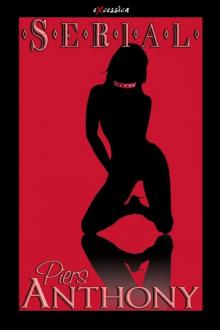 Serial
Serial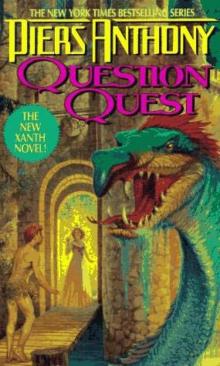 Question Quest
Question Quest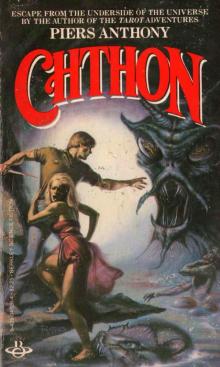 Chthon
Chthon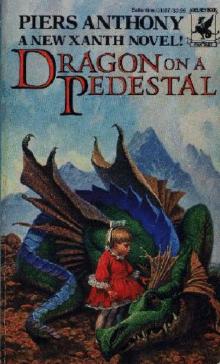 Dragon on a Pedestal
Dragon on a Pedestal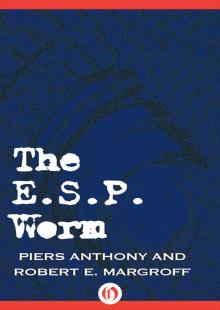 E. S. P. Worm
E. S. P. Worm Hope of Earth
Hope of Earth The Series Boxed Set
The Series Boxed Set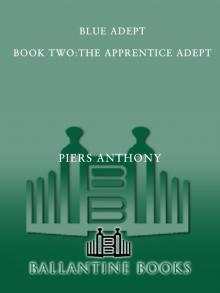 Blue Adept
Blue Adept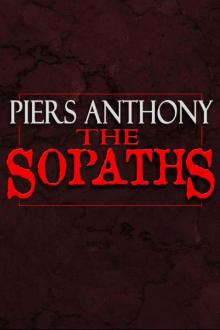 The Sopaths
The Sopaths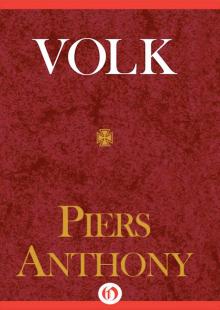 Beetle Juice
Beetle Juice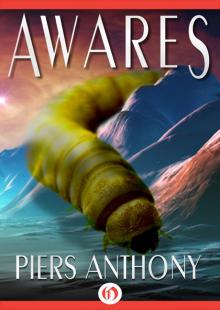 Awares
Awares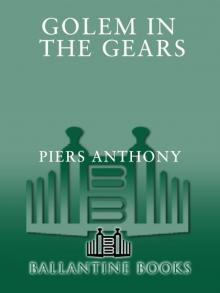 Golem in the Gears
Golem in the Gears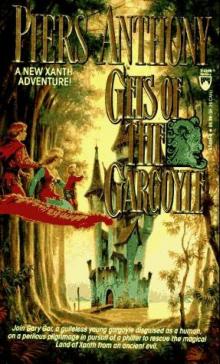 Geis of the Gargoyle
Geis of the Gargoyle Bamboo Bloodbath and Ninja's Revenge
Bamboo Bloodbath and Ninja's Revenge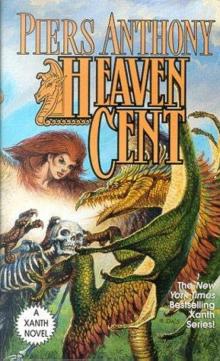 Heaven Cent
Heaven Cent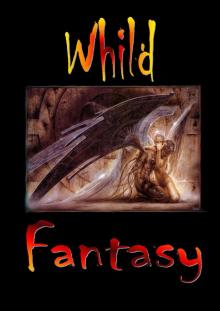 Neq the Sword
Neq the Sword Pandora Park
Pandora Park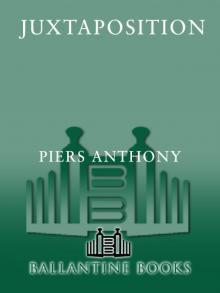 Juxtaposition
Juxtaposition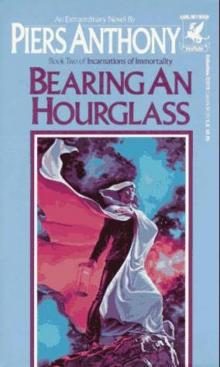 Bearing an Hourglass
Bearing an Hourglass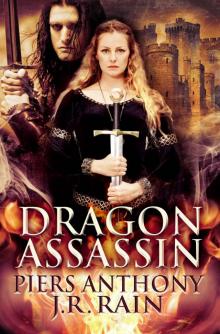 Dragon Assassin
Dragon Assassin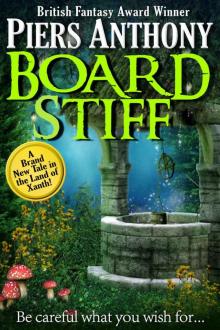 Board Stiff
Board Stiff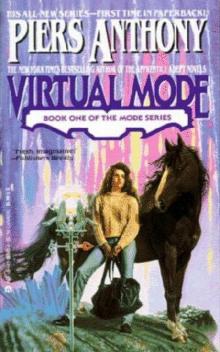 Virtual Mode
Virtual Mode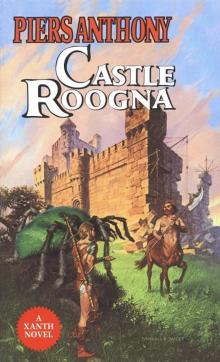 Castle Roogna
Castle Roogna Aliena Too
Aliena Too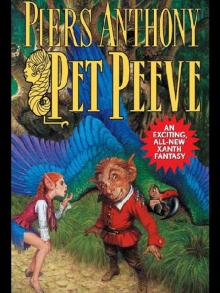 Pet Peeve
Pet Peeve The Metal Maiden Collection
The Metal Maiden Collection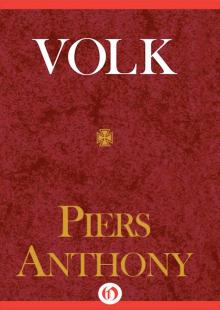 Volk
Volk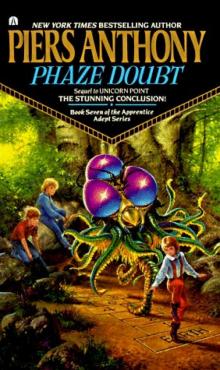 Phaze Doubt
Phaze Doubt The Color of Her Panties
The Color of Her Panties Amazon Slaughter and Curse of the Ninja Piers Anthony
Amazon Slaughter and Curse of the Ninja Piers Anthony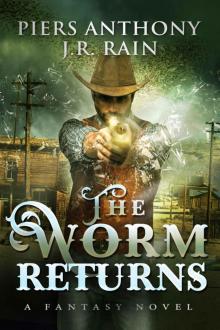 The Worm Returns
The Worm Returns Zombie Lover
Zombie Lover Xone of Contention
Xone of Contention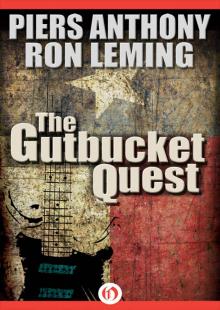 The Gutbucket Quest
The Gutbucket Quest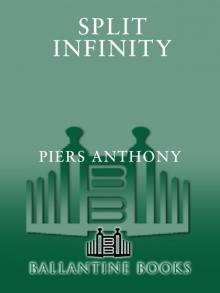 Split Infinity
Split Infinity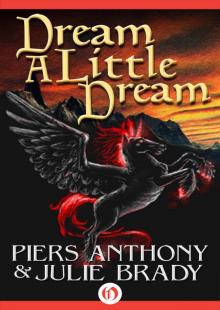 Dream a Little Dream: A Tale of Myth and Moonshine
Dream a Little Dream: A Tale of Myth and Moonshine Balook
Balook Out of Phaze
Out of Phaze The Secret of Spring
The Secret of Spring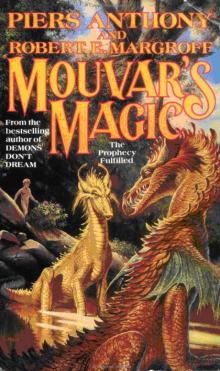 Mouvar's Magic
Mouvar's Magic Cube Route
Cube Route Mercenary
Mercenary Total Recall
Total Recall Man From Mundania
Man From Mundania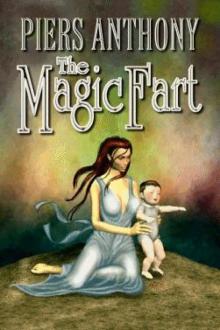 The Magic Fart
The Magic Fart Letters to Jenny
Letters to Jenny Jack and the Giants
Jack and the Giants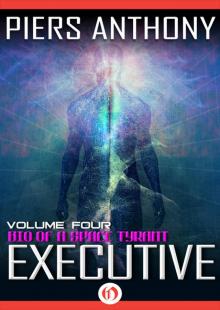 Executive
Executive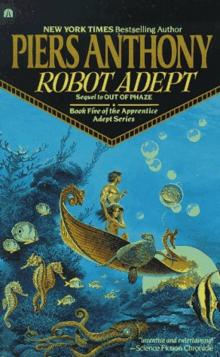 Robot Adept
Robot Adept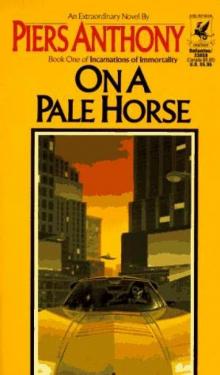 On A Pale Horse
On A Pale Horse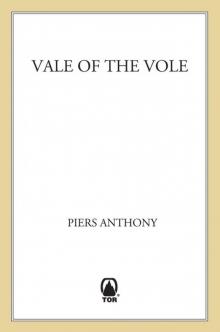 Vale of the Vole
Vale of the Vole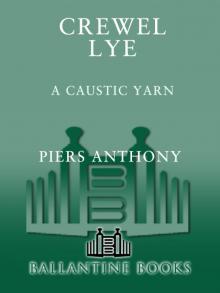 Crewel Lye
Crewel Lye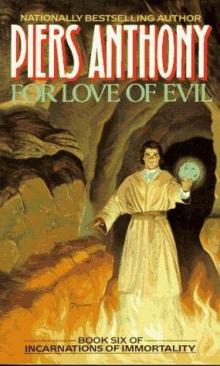 For Love of Evil
For Love of Evil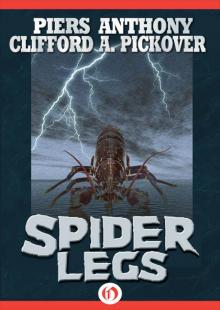 Spider Legs
Spider Legs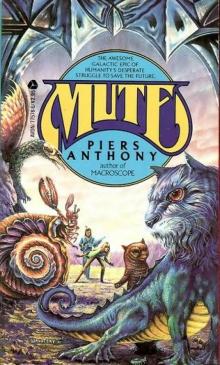 Mute
Mute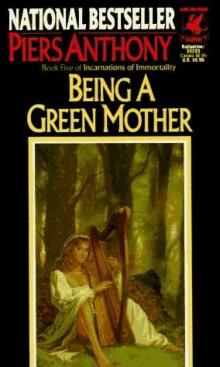 Being a Green Mother
Being a Green Mother Hair Suite
Hair Suite Air Apparent
Air Apparent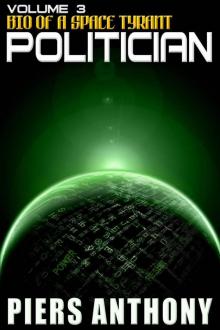 Politician
Politician Aliena
Aliena Phthor
Phthor Ghost Writer in the Sky
Ghost Writer in the Sky Pornucopia
Pornucopia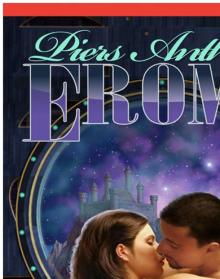 Eroma
Eroma Shepherd
Shepherd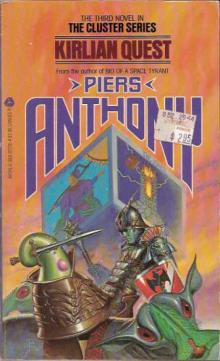 Kirlian Quest
Kirlian Quest Swell Foop
Swell Foop God of Tarot
God of Tarot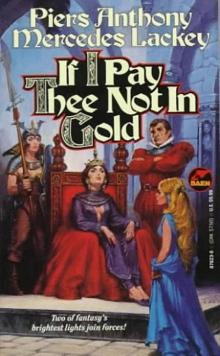 If I Pay Thee Not in Gold
If I Pay Thee Not in Gold Amazon Expedient
Amazon Expedient Faun & Games
Faun & Games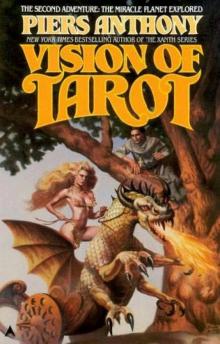 Vision of Tarot
Vision of Tarot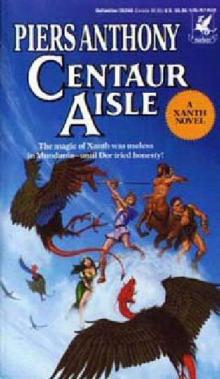 Centaur Aisle
Centaur Aisle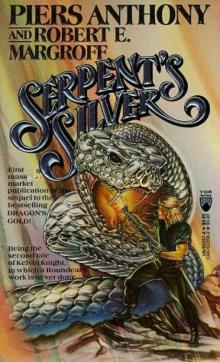 Serpent's Silver
Serpent's Silver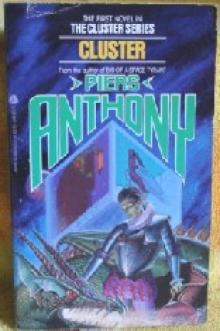 Cluster
Cluster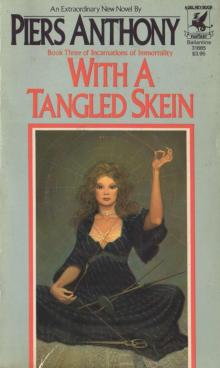 With a Tangled Skein
With a Tangled Skein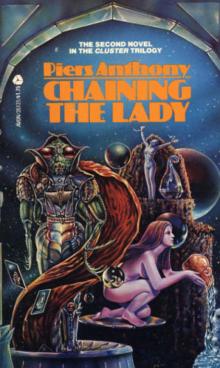 Chaining the Lady
Chaining the Lady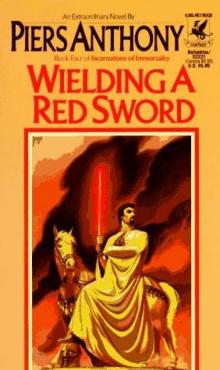 Wielding a Red Sword
Wielding a Red Sword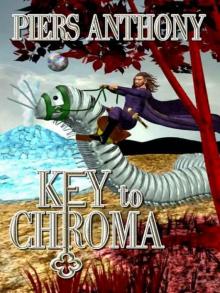 Key to Chroma
Key to Chroma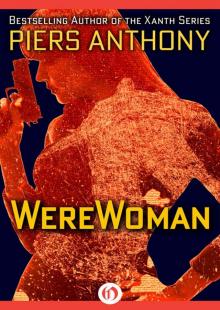 WereWoman
WereWoman Isis Orb
Isis Orb Hair Peace
Hair Peace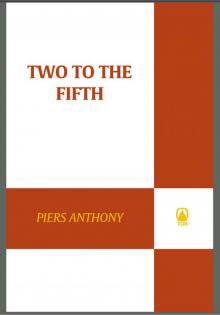 Two to the Fifth
Two to the Fifth Viscous Circle
Viscous Circle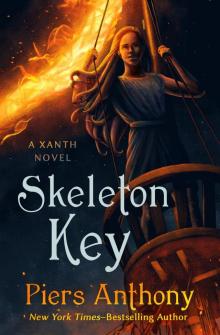 Skeleton Key
Skeleton Key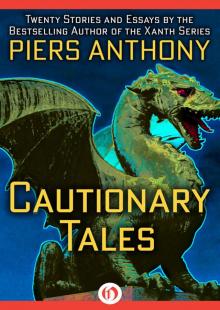 Cautionary Tales
Cautionary Tales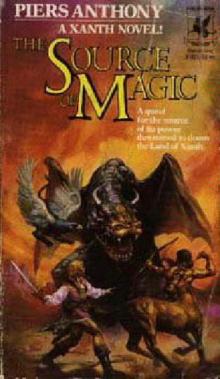 The Source of Magic
The Source of Magic Unicorn Point
Unicorn Point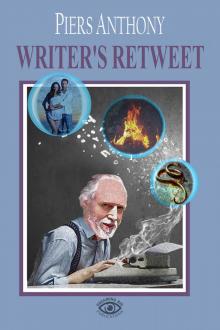 Writer's Retweet
Writer's Retweet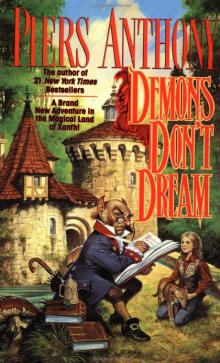 Demons Don't Dream
Demons Don't Dream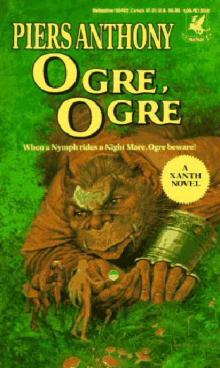 Ogre, Ogre
Ogre, Ogre The Iron Maiden
The Iron Maiden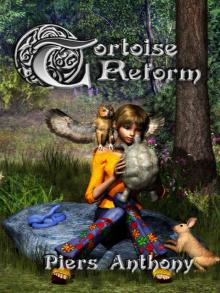 Tortoise Reform
Tortoise Reform Luck of the Draw
Luck of the Draw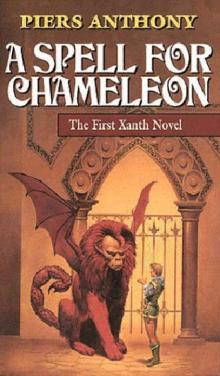 A Spell for Chameleon
A Spell for Chameleon Yon Ill Wind
Yon Ill Wind Currant Events
Currant Events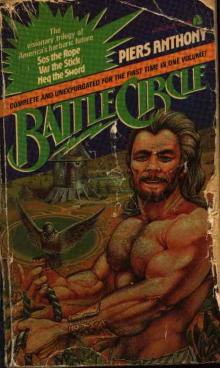 Var the Stick
Var the Stick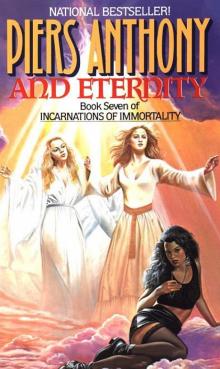 And Eternity
And Eternity Kiai! & Mistress of Death
Kiai! & Mistress of Death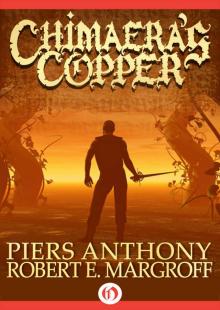 Chimaera's Copper
Chimaera's Copper Refugee
Refugee Isle of View
Isle of View Thousandstar
Thousandstar Mer-Cycle
Mer-Cycle Service Goat
Service Goat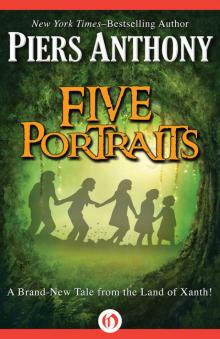 Five Portraits
Five Portraits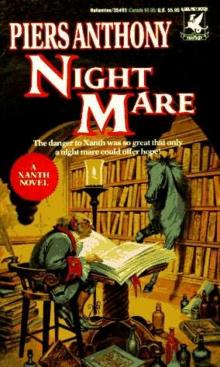 Night Mare
Night Mare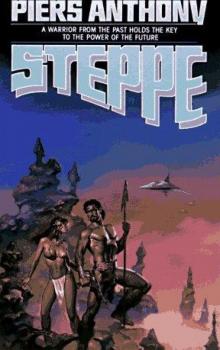 Steppe
Steppe Lavabull
Lavabull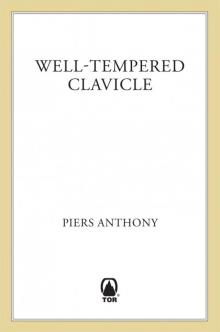 Well-Tempered Clavicle
Well-Tempered Clavicle Aladdin Relighted
Aladdin Relighted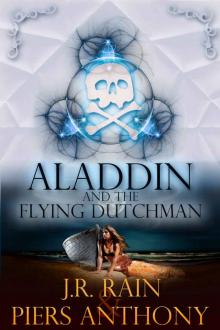 Aladdin and the Flying Dutchman
Aladdin and the Flying Dutchman Knot Gneiss
Knot Gneiss Roc and a Hard Place
Roc and a Hard Place Aladdin Sins Bad
Aladdin Sins Bad Flytrap
Flytrap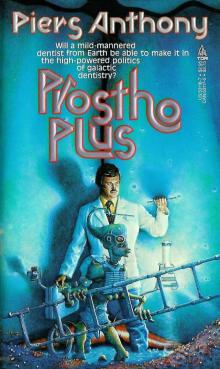 Prostho Plus
Prostho Plus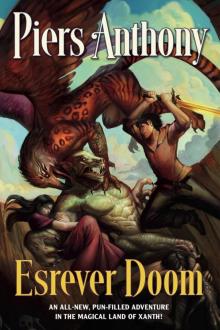 Esrever Doom
Esrever Doom Hair Power
Hair Power The Journey
The Journey Virtue Inverted
Virtue Inverted Of Man and Manta Omnibus
Of Man and Manta Omnibus Trail Mix: Amoeba
Trail Mix: Amoeba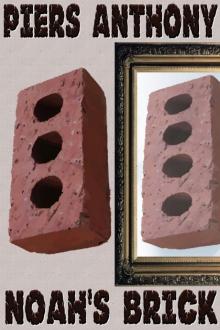 Noah's Brick
Noah's Brick Odd Exam
Odd Exam Magenta Salvation
Magenta Salvation Jest Right
Jest Right Fire Sail
Fire Sail Chthon a-1
Chthon a-1 Amoeba
Amoeba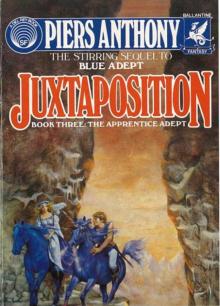 Juxtaposition aa-3
Juxtaposition aa-3 Pira
Pira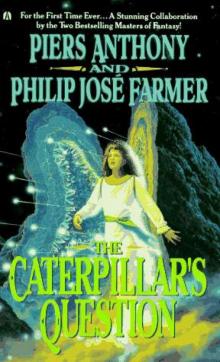 THE CATERPILLARS QUESTION
THE CATERPILLARS QUESTION What Fears Become: An Anthology from The Horror Zine
What Fears Become: An Anthology from The Horror Zine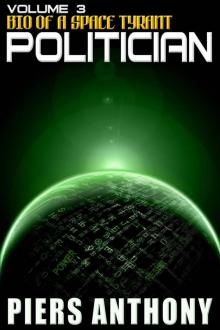 Bio of a Space Tyrant Vol. 3. Politician
Bio of a Space Tyrant Vol. 3. Politician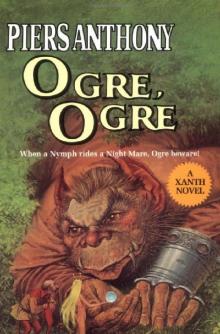 Ogre Ogre x-5
Ogre Ogre x-5 Rings of Ice
Rings of Ice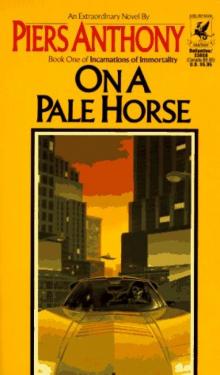 On a Pale Horse ioi-1
On a Pale Horse ioi-1 Luck of the Draw (Xanth)
Luck of the Draw (Xanth)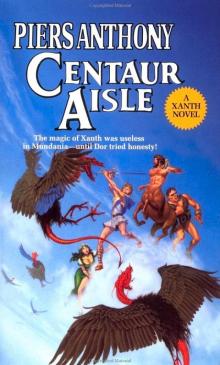 Centaur Aisle x-4
Centaur Aisle x-4 Thousandstar (#4 of the Cluster series)
Thousandstar (#4 of the Cluster series)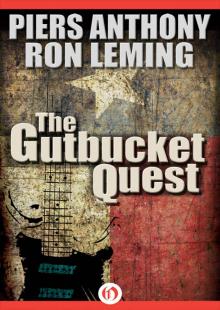 Gutbucket Quest
Gutbucket Quest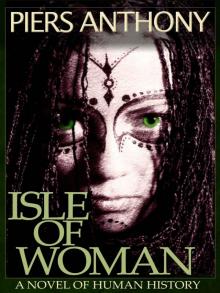 Isle of Woman (Geodyssey)
Isle of Woman (Geodyssey)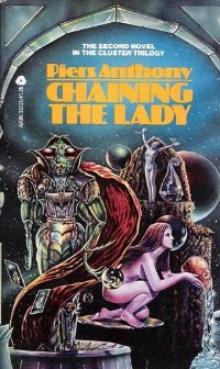 Chaining the Lady c-2
Chaining the Lady c-2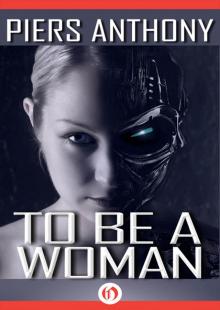 To Be a Woman
To Be a Woman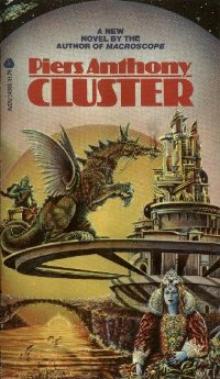 Cluster c-1
Cluster c-1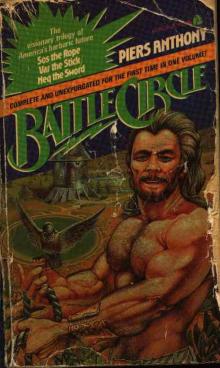 Battle Circle 2 - Var the Stick
Battle Circle 2 - Var the Stick Mercenary (Bio of a Space Tyrant Book 2)
Mercenary (Bio of a Space Tyrant Book 2)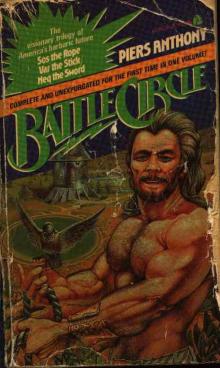 Battle Circle 1 - Sos the Rope
Battle Circle 1 - Sos the Rope Xanth 30 - Stork Naked
Xanth 30 - Stork Naked Secret of Spring
Secret of Spring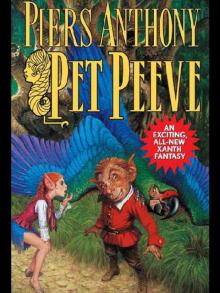 Xanth 29 - Pet Peeve
Xanth 29 - Pet Peeve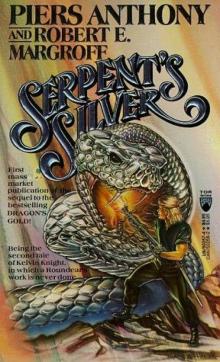 Serpents's Silver
Serpents's Silver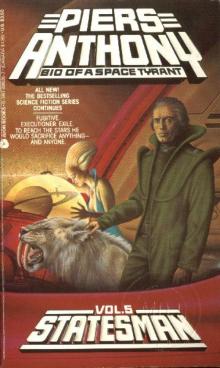 Statesman by Piers Anthony
Statesman by Piers Anthony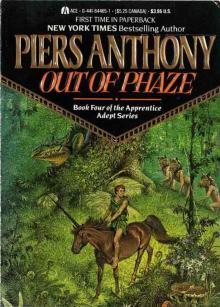 Out of Phaze aa-4
Out of Phaze aa-4 Amazon Slaughter & Curse of the Ninja
Amazon Slaughter & Curse of the Ninja